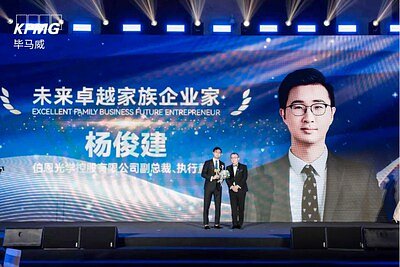
Beyond the Parts Bin: Biel Crystal Forges a Brand Identity From Manufacturing Prowess
For decades, Biel Crystal has been the unseen hand crafting components for tech giants. Now, under new leadership, the company is stepping out of the shadows, aiming to become a recognized innovator in its own right.
Beyond the Parts Bin: Biel Crystal Forges a Brand Identity From Manufacturing Prowess
By Angela Gray | November 05, 2025
SHENZHEN, CHINA – For decades, Biel Crystal has operated as a crucial, yet largely invisible, component of the global tech supply chain. The company's expertise in crafting exterior structures and modules has underpinned the success of some of the world’s most recognizable devices, from iPhones to Samsung Galaxies. But Biel Crystal isn’t content to remain in the background. Under the leadership of Simon Yeung, the company is embarking on a bold transformation – shifting from a purely OEM-focused manufacturer to a technology-driven brand with ambitions of innovation and global recognition.
Yeung’s recent recognition with the KPMG China Future Entrepreneur Award underscores this strategic pivot. The award, presented on October 24th, acknowledges not just Biel Crystal’s impressive manufacturing capabilities, but also Yeung’s vision for a future where the company is defined by its own intellectual property and innovative design, rather than simply fulfilling orders for others.
“Inheritance is not copying, but evolution,” Yeung stated in a company press release. This sentiment encapsulates Biel Crystal’s current trajectory – a deliberate move away from its reliance on OEM contracts and towards a future where it dictates the terms of its own success. But the journey is complex, requiring significant investment in research and development, a reimagining of its supply chain strategies, and a willingness to compete directly with established tech brands.
From Parts Provider to Innovation Driver
Founded over 30 years ago, Biel Crystal has quietly become a behemoth in the component manufacturing world. With nine production bases worldwide, over 100,000 employees, and an annual production capacity of 2.2 billion units, the company is a major player in the global supply chain. Its client list reads like a who’s who of the tech industry: Apple, Samsung, Xiaomi, Meta, Tesla, and Google are all reliant on Biel Crystal's expertise.
However, this success has come with its own set of challenges. Operating primarily as an OEM manufacturer means that Biel Crystal is often at the mercy of its clients' demands and pricing pressures. It also limits the company's ability to capture the full value of its innovations.
“For years, Biel Crystal has been incredibly successful at making things to spec,” explains a supply chain analyst who requested anonymity. “But building a brand requires more than just manufacturing prowess. It demands design thinking, marketing savvy, and a willingness to take risks.”
Yeung appears determined to address these challenges head-on. The company is reportedly investing heavily in R&D, focusing on areas such as advanced materials, precision engineering, and innovative design. This investment is aimed at creating a portfolio of proprietary technologies and products that can differentiate Biel Crystal from its competitors.
Diversifying Beyond the Usual Suspects
A key component of Biel Crystal’s transformation strategy is diversification. While Apple remains a significant client, the company is actively seeking to expand its customer base and reduce its dependence on any single client. This includes targeting emerging markets and exploring opportunities in new industries, such as automotive and augmented/virtual reality (AR/VR).
“The AR/VR space is particularly exciting,” says a source within Biel Crystal’s R&D department. “There’s a huge demand for lightweight, durable, and aesthetically pleasing materials for AR/VR headsets, and we believe we have the expertise to deliver.”
The company is also exploring opportunities in the automotive industry, leveraging its expertise in precision engineering and materials science to develop components for electric vehicles (EVs). This includes designing and manufacturing structural components, housings, and other critical parts.
China's Manufacturing Upgrade: A Case Study
Biel Crystal’s transformation is not happening in a vacuum. It’s part of a larger trend of industrial upgrading in China, as manufacturers seek to move beyond low-cost production and embrace innovation, technology, and globalization. The Chinese government has been actively promoting this shift, providing financial incentives and policy support to companies that invest in R&D and innovation.
“China is no longer content to be the ‘world’s factory’,” explains a China-based economist. “The government is determined to transform the country into a global innovation hub, and companies like Biel Crystal are playing a key role in that transformation.”
However, the transition is not without its challenges. Chinese manufacturers face competition from established tech giants in the United States and Europe, as well as from emerging manufacturers in other parts of Asia. They also need to overcome barriers to innovation, such as a lack of intellectual property protection and a shortage of skilled workers.
The Road Ahead
Biel Crystal’s ambition to become a recognized innovator is a bold one. The company faces significant challenges, but it also has several advantages, including its manufacturing expertise, its access to capital, and its strong relationships with key clients.
Whether Biel Crystal can successfully transform itself from a parts provider to an innovation driver remains to be seen. However, its recent investments in R&D, its diversification strategy, and its commitment to innovation suggest that the company is on the right track. The KPMG award is not just a recognition of past achievements, but a signal of a future where Biel Crystal is no longer content to operate in the shadows, but is determined to take its place among the leaders of the global tech industry. The shift is a testament to a changing landscape where manufacturing prowess is no longer enough, and innovation is the key to long-term success.
